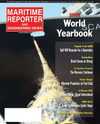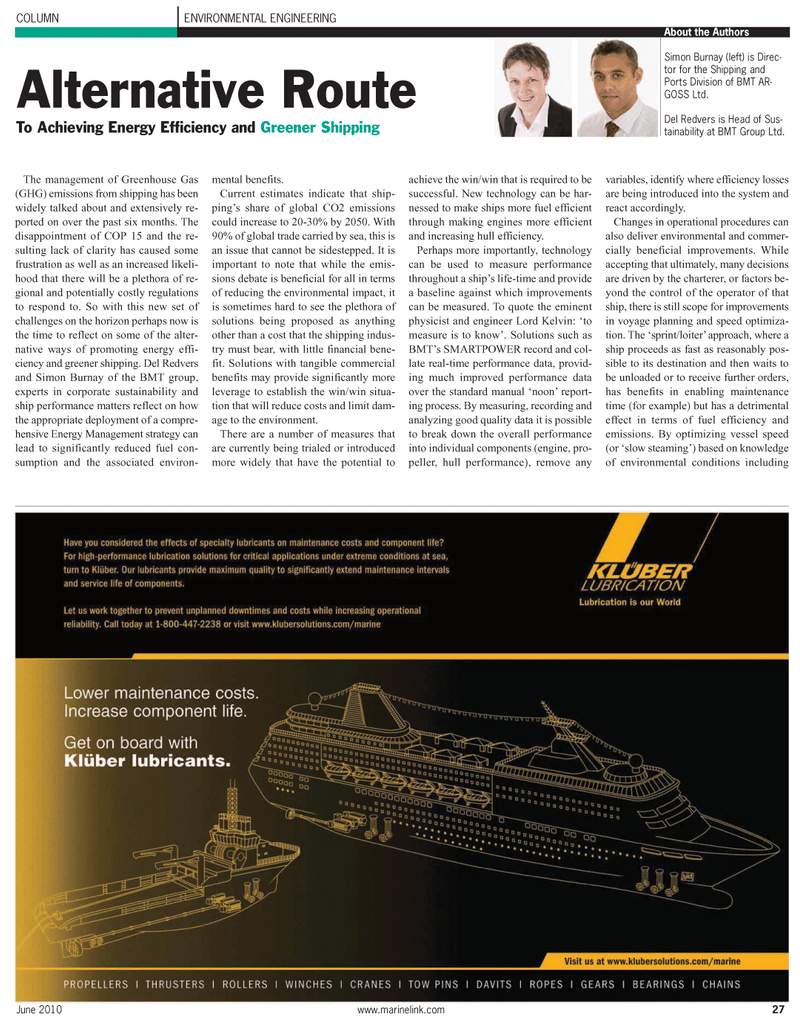
Page 27: of Maritime Reporter Magazine (June 2, 2010)
Read this page in Pdf, Flash or Html5 edition of June 2, 2010 Maritime Reporter Magazine
June 2010 www.marinelink.com 27
COLUMN ENVIRONMENTAL ENGINEERING
Alternative Route
To Achieving Energy Efficiency and Greener Shipping
About the Authors
Simon Burnay (left) is Direc- tor for the Shipping and
Ports Division of BMT AR-
GOSS Ltd.
Del Redvers is Head of Sus- tainability at BMT Group Ltd.
The management of Greenhouse Gas (GHG) emissions from shipping has been widely talked about and extensively re- ported on over the past six months. The disappointment of COP 15 and the re- sulting lack of clarity has caused some frustration as well as an increased likeli- hood that there will be a plethora of re- gional and potentially costly regulations to respond to. So with this new set of challenges on the horizon perhaps now is the time to reflect on some of the alter- native ways of promoting energy effi- ciency and greener shipping. Del Redvers and Simon Burnay of the BMT group, experts in corporate sustainability and ship performance matters reflect on how the appropriate deployment of a compre- hensive Energy Management strategy can lead to significantly reduced fuel con- sumption and the associated environ- mental benefits.
Current estimates indicate that ship- ping’s share of global CO2 emissions could increase to 20-30% by 2050. With 90% of global trade carried by sea, this is an issue that cannot be sidestepped. It is important to note that while the emis- sions debate is beneficial for all in terms of reducing the environmental impact, it is sometimes hard to see the plethora of solutions being proposed as anything other than a cost that the shipping indus- try must bear, with little financial bene- fit. Solutions with tangible commercial benefits may provide significantly more leverage to establish the win/win situa- tion that will reduce costs and limit dam- age to the environment.
There are a number of measures that are currently being trialed or introduced more widely that have the potential to achieve the win/win that is required to be successful. New technology can be har- nessed to make ships more fuel efficient through making engines more efficient and increasing hull efficiency.
Perhaps more importantly, technology can be used to measure performance throughout a ship’s life-time and provide a baseline against which improvements can be measured. To quote the eminent physicist and engineer Lord Kelvin: ‘to measure is to know’. Solutions such as
BMT’s SMARTPOWER record and col- late real-time performance data, provid- ing much improved performance data over the standard manual ‘noon’ report- ing process. By measuring, recording and analyzing good quality data it is possible to break down the overall performance into individual components (engine, pro- peller, hull performance), remove any variables, identify where efficiency losses are being introduced into the system and react accordingly.
Changes in operational procedures can also deliver environmental and commer- cially beneficial improvements. While accepting that ultimately, many decisions are driven by the charterer, or factors be- yond the control of the operator of that ship, there is still scope for improvements in voyage planning and speed optimiza- tion. The ‘sprint/loiter’ approach, where a ship proceeds as fast as reasonably pos- sible to its destination and then waits to be unloaded or to receive further orders, has benefits in enabling maintenance time (for example) but has a detrimental effect in terms of fuel efficiency and emissions. By optimizing vessel speed (or ‘slow steaming’) based on knowledge of environmental conditions including

 26
26

 28
28
